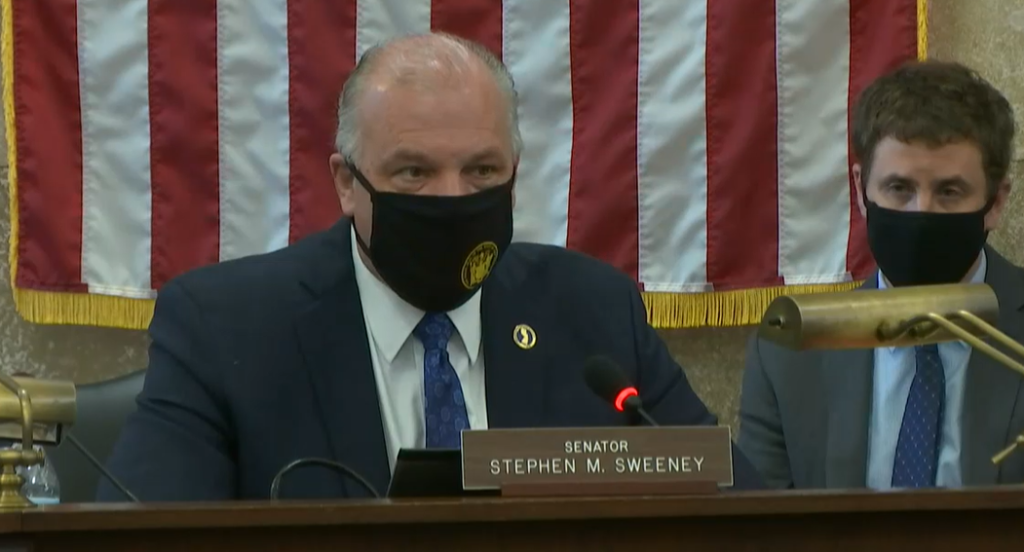Sweeney-Vitale Bill Requiring Infection Prevention Plans for Nursing Homes Advances Companion Bill Would Create Infection Control Training for Nurses

Sweeney-Vitale Bill Requiring Infection Prevention Plans for Nursing Homes Advances
Companion Bill Would Create Infection Control Training for Nurses
Trenton – The state would develop an infection prevention and control plan for nursing homes according to legislation authored by Senate President Steve Sweeney and Senator Joe Vitale that gained the approval of the Senate Budget Committee today.
The bill, S-3032, would require the New Jersey Department of Health to assess infection control and prevention policies and develop a statewide plan to improve existing systems. The committee also approved a companion measure, S-3031, sponsored by Senator Sweeney and Senator Vitale, that would have state health officials develop infectious disease instructional programs for nurses who work in long-term care facilities.
“We need a long-term strategy to ensure the nursing home industry in New Jersey is focused on the safety of residents and caregivers as well as the quality of the services the facilities provide,” said Senator Sweeney (D-Gloucester/Salem/Cumberland). “This strategy should include design and construction standards for new facilities and for those undergoing significant modifications. The infrastructure itself should promote and facilitate safe conditions for the residents who live there and the employees who care for them.”
About one-third of New Jersey’s nursing homes were cited for infection control deficiencies in 2017, according to Manatt Health’s review of the state’s long-term care industry.
“The fatal consequences of the COVID-19 pandemic fell the hardest on nursing homes, veterans’ homes and other long term care facilities that are home to our most vulnerable population of residents,” said Senator Vitale (D-Middlesex), the chairman of the Health Committee. “It is tragically obvious that there was an absence of safeguards to prevent and respond to the outbreak. A statewide assessment will help provide the information we need to put in place infection control and prevention practices to better protect the health and safety of the residents and workers in New Jersey’s long-term care facilities.”
Following the recommendations of the Mannatt report and with the consultation of stakeholders, this legislation requires essential standards for review. The standards include:
- A count of the total number of single-resident rooms in nursing homes, the percentage of beds that are utilized in single-resident rooms, and a review of the ability of nursing homes to expand single room capacity;
- A survey of the maintenance status of heating, ventilating, air conditioning, and refrigeration systems in nursing homes;
- A study of the features intended to increase infection control and prevention capability;
- Infrastructure-related considerations recommended by the New Jersey Task Force on Long-Term Care Quality and Safety.
The department would be required to consult with the nursing home industry, both for-profit and non-profit facilities, groups representing direct care providers, as well as support staff in nursing homes, resident advocates, and the families of residents.
The companion bill would have the Department of Health work with the Association for Professionals in Infection Control and Epidemiology to develop an infection prevention course specifically designed for registered nurses and certified nurse aides employed in long-term care facilities.
Under the bill, the Health Department and the Board of Nursing would review the nursing curriculum to develop methods to encourage nurses to enroll in post-acute care residency programs and to determine if the curriculum should be modified to better prepare them to work in the field.
The measure would also require the department to review the certification curriculum for certified nurse aides and work with the long-term care industry to develop a pilot program with standards for their professional advancement.
“As the coronavirus pandemic continues to challenge our state, our nation and the world in new and unpredictable ways, these long term care bills provide a path for New Jersey to ensure we are prepared and ready to control infectious disease outbreaks,” HPAE President Debbie White, RN, said. “We applaud Senate President Sweeney and Senator Vitale for their continued leadership in efforts to hold operators of long term care facilities accountable for creating a safe environment that will protect workers, patients and residents alike.”
Both bills were approved by the Senate Budget and Appropriations Committee.
(Visited 30 times, 1 visits today)







